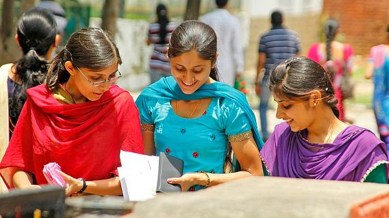Indian workforce needs 145 million more women to hit $30 trillion economy target by 2047: Report
Currently, only 35-40 per cent of Indian women participate in the workforce, and projections indicate that without intervention, India will only reach a 45 per cent female labor force participation rate (FLFPR) by 2047.

India must add 145 million women to its workforce by 2047 to achieve a $30 trillion economy, a new report by Magic Bus India Foundation and Bain and Company reveals. Currently, only 35-40 per cent of Indian women participate in the workforce, and projections indicate that without intervention, India will only reach a 45 per cent female labor force participation rate (FLFPR) by 2047, adding just 110 million women.
The report – From Aspiration to Action: Building India’s 400 Million Women Workforce, calls for raising the FLFPR to 70 per cent, focusing on two key models:
monthly limit of free stories.
with an Express account.
E4 Model (Enabling Entrepreneurship): Targeted at rural women, this model promotes ecologically embedded entrepreneurial ecosystems. It aims to provide mentorship, skill-building, market linkages, and access to capital, creating self-sustaining opportunities for women entrepreneurs in local communities.
PROGRES Model (Creating Jobs): Designed for urban women, the PROGRES model focuses on professional readiness, growth, and resilience. This includes providing skills training, childcare support, and flexible work environments to meet the specific needs of women in urban settings.
By addressing the “missing women” gap through these models, India could potentially unlock $14 trillion in economic value from increased female workforce participation, significantly boosting its economic growth trajectory.
The study identifies seven archetypes within India’s female workforce, with specific challenges faced by women in rural and urban regions. Rural women, who are projected to make up approximately 70 per cent of the workforce gap by 2047, encounter barriers like limited job opportunities and unstable work environments. Urban women, on the other hand, face job-skill mismatches, undervaluation of domestic work, and wage disparities.
The report’s primary focus archetypes—Aspirational Homemakers, High-Potential Youth, Home-Based and Nano Entrepreneurs, and Casual Labour (including Gig Workers)—are seen as key segments to drive immediate action and close the participation gap.
Magic Bus CEO Jayant Rastogi emphasized, “Increasing women’s workforce participation is both an economic necessity and a step toward gender equality.”
The report urges coordinated action across government, private sectors, and nonprofits to overcome barriers and create sustainable jobs for India’s women, bridging the gap toward inclusive growth.